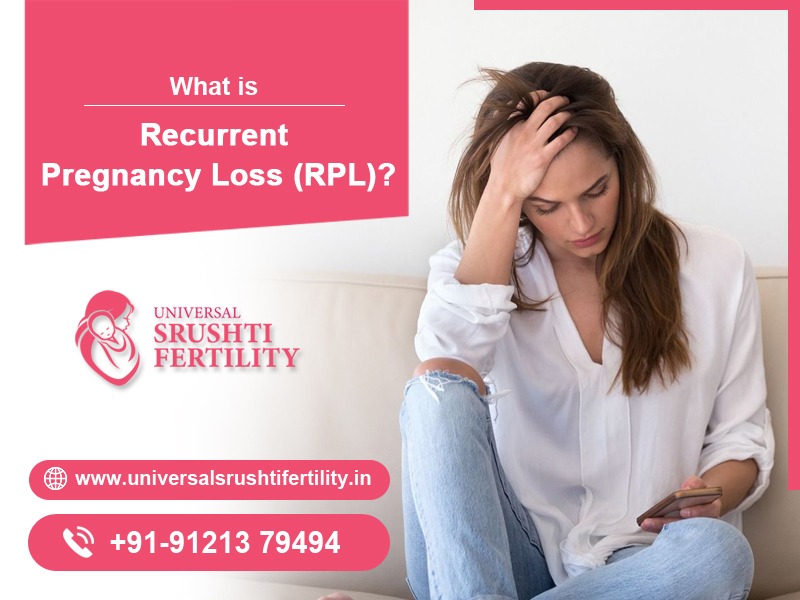Treatment for Recurrent Pregnancy Loss
Pregnancy in many women goes smooth, but some women experience a miscarriage at one time or another. But some women suffer from multiple pregnancy losses, i.e., more than one or two, and it is referred to as recurrent pregnancy loss (RPL).
There might be many reasons, and having a pregnancy loss doesn’t mean that woman can never have a healthy pregnancy or might have another miscarriage if she conceives again.
Often, RPL is considered a natural process. Nearly half of the causes of recurrent miscarriages are treatable. Almost two-thirds of women can have a healthy pregnancy even after multiple miscarriages if they take proper medical care.
Definition of recurrent pregnancy loss (RPL)
Recurrent miscarriage, which is also known as recurrent pregnancy loss or abortion, is defined as when a woman suffers from two or more continuous pregnancy losses. In a survey, it is said that nearly 15% of pregnancies end in miscarriages, which happen before 20 weeks from the time of conceiving. Most miscarriages or pregnancy loss occur within the first 12 weeks from the time of conceiving.
What are the causes of recurrent pregnancy loss (RPL)
According to some studies, the cause of recurrent miscarriages is a genetic abnormality. The risk of these miscarriages even increases as a woman ages. The risk of genetic abnormalities increases from 15% to 20% if she is around 35 years, and the risk rises to more than 50% if she crosses 40 years.
A genetic abnormality is defined as when a fertilized egg gets an abnormal number of chromosomes during the formation of an embryo.
- Anatomic abnormalities like a septate uterus or abnormally shaped uterus.
- An incompetent cervix or weak cervix can’t support the fetus, which might result in miscarriage.
Medical conditions
Various medical conditions also increase the risk of recurrent pregnancy loss, which include:
- Antiphospholipid syndrome (APS)
- Thyroid/hormonal issues
- Fibroids and polyps
- Asherman’s syndrome
- Blood clotting disorders like systemic lupus erythematosus and antiphospholipid syndrome
Most of them can be treated either with medication or through surgery. All you need to do is consult a fertility expert or a gynecologist when you have a miscarriage. They run some diagnostic tests and suggest an appropriate treatment option.
Treatment of recurrent pregnancy loss
Treatments for recurrent pregnancy loss include lifestyle modification, medications, and surgery helps improve the possibilities of a successful pregnancy. In addition, by treating certain conditions associated with recurrent pregnancy loss, the risk for future miscarriages can also be prevented.
Experts say that even after three pregnancy losses, a woman has a chance of 60% to 80% to conceive and carry a full-term pregnancy. Often, women try to get pregnant naturally even after miscarriages, but certain health conditions need to be treated to reduce the chance of having another miscarriage.
Particular health ailments like septate uterus, abnormal uterus shape can, and fibroids or scar tissue can be treated surgically and help to reduce miscarriages. Surgical correction is a selective treatment for anatomical problems because it enhances the live birth rate.
In case of autoimmune problems like APS, a doctor suggests taking blood-thinning medications like low aspirin doses or heparin. Sometimes pregnant women also take blood-thinning medications to reduce the risk of pregnancy loss but only when advised by a doctor because there is a risk of severe bleeding problems.
Medical conditions like abnormal blood sugar levels, thyroid problems, or hormonal imbalances can be efficiently managed through treatment to improve the odds of a healthy, full-term pregnancy. Medicines that trigger the dopamine receptors or progesterone supplements might help in this process.
If the doctor diagnoses chromosomal defects like translocation, then he or she might recommend a genetic screening. Though many couples with translocations might have healthy and natural pregnancies but to eliminate the complications, some doctors suggest undergoing fertility treatments like ICSI (intracytoplasmic sperm injection) or IVF (in-vitro fertilization); an innovative process in which an embryologist collects eggs and sperm from the couple and combines them in a lab.
The advantage of this process is that the embryos are tested for genetic defects using a technique called preimplantation genetic diagnosis (PGD). Only a healthy embryo is transferred to the uterus, which improves the chances of a healthy pregnancy outcome.
In addition, both male and female partners should maintain good lifestyle choices like taking a healthy diet, avoiding cigarette smoking, drinking alcohol, using illegal drugs, and limiting caffeine intake can lower the chances of recurrent pregnancy loss. Maintaining a healthy weight is also very important to reduce the risk of recurrent miscarriage. There is no clinical evidence that stress, anxiety, and depression cause recurrent miscarriages, but experts say they might play a role.
If you have experienced miscarriages, you should consult a doctor. To know more important information or looking for RPL treatment, consult our experts at Srushti Fertility Centre in Hyderabad. We can help you.


